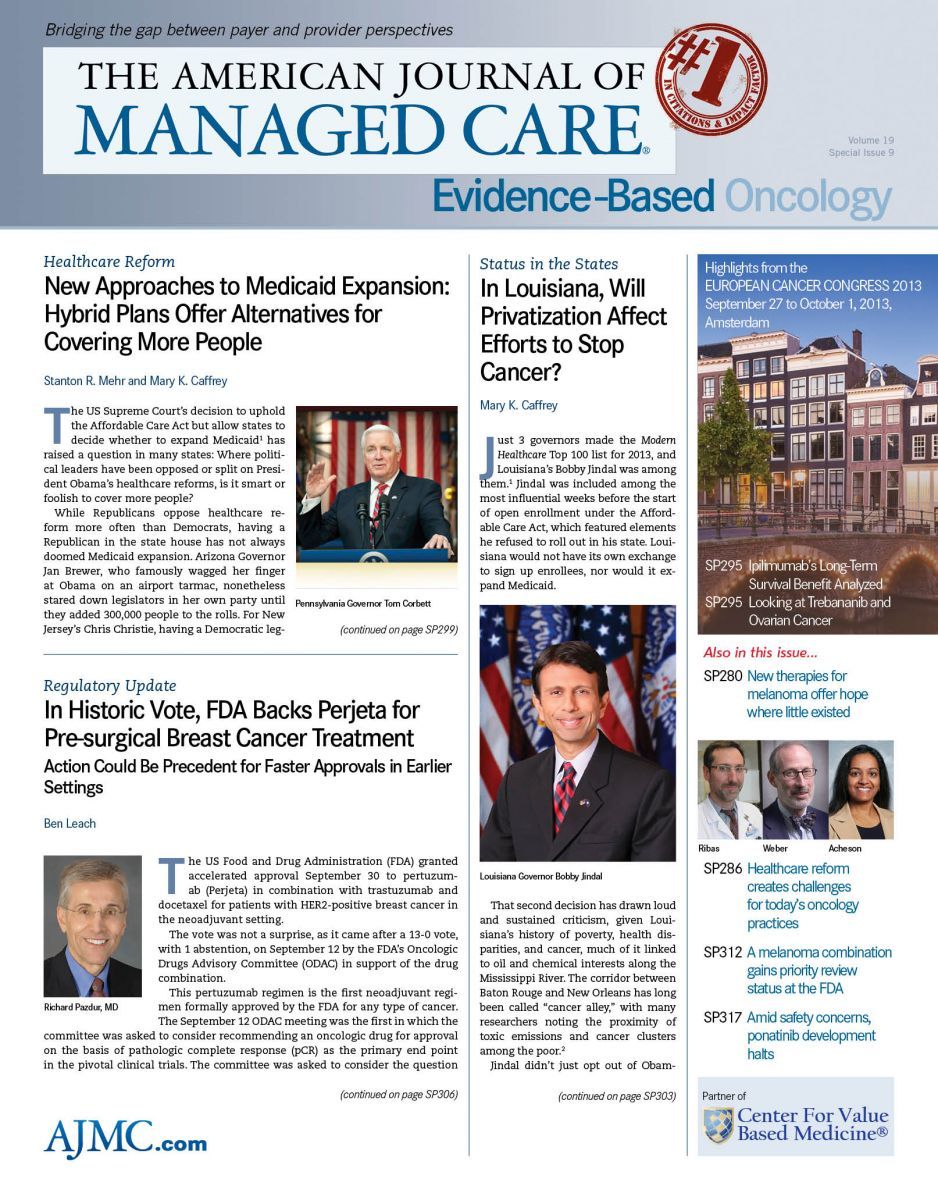- Center on Health Equity & Access
- Clinical
- Health Care Cost
- Health Care Delivery
- Insurance
- Policy
- Technology
- Value-Based Care
Trebananib Shows Promise in Recurrent Platinum-Sensitive Ovarian Cancer
European Cancer Congress 2013
Trebananib added to paclitaxel significantly improved progression-free survival (PFS) in patients with recurrent ovarian cancer compared with placebo plus paclitaxel in the large international TRINOVA-1 trial. The addition of trebananib to paclitaxel achieved a 52% prolongation in time-to-disease progression or death, with a median PFS of 7.2 months, versus 5.4 months with placebo
(P <.001).
Trebananib (formerly AMG 386) is an investigational anti-angiogenesis recombinant peptide that inhibits the binding of angiopoietin 1 and 2 to the Tie2 receptor—a different target than that of bevacizumab, a VEGF-receptor inhibitor commonly used to treat ovarian cancer. “Anti-VEGF therapy creates a constellation of adverse events. In the TRINOVA series, the idea is to target a non-VEGF angiogenesis factor angiopoeitin 1 and 2.
This strategy has been shown to delay tumor growth and shrink tumors,” explained Bradley Monk, MD, Creighton University School of Medicine and University of Arizona Cancer Center at St. Joseph’s Hospital in Phoenix. Monk reported these results at the 2013 European Cancer Congress in Amsterdam (September 27-October 1, 2013).
“This was a rigorous and closely audited clinical trial conducted at 179 sites in 32 countries. Today, we present the primary PFS analysis and the interim overall survival [OS] analysis. Next year we hope to have the final OS data,” he told listeners.
Patients enrolled in the phase III trial (n = 919) received up to 3 prior therapies and had recurrent disease within less than 12 months of their last prior therapy. They were randomized to a 3 weeks on/1 week off regimen of weekly paclitaxel, with one arm receiving paclitaxel plus placebo and the experimental group being treated with paclitaxel plus once-weekly trebananib 15 mg/kg IV. The average age of patients was about 60 years, and most were Caucasian. Treatment arms were well-balanced for disease and demographic factors. The majority had grade 2 to 3 cancers; 40% failed on 1 prior therapy; 40% failed on 2; and 20% failed on 3.
In addition to the primary endpoint of PFS in the overall trial, trebananib improved PFS in all subgroups. Response rate was improved from 30% with placebo to 38% with trebananib. Most responses were deemed partial response. At the interim survival analysis, the OS difference favoring trebananib is about 2 months, but only half of the survival events have occurred. Discontinuations were mostly due to disease progression: 87% in the placebo group versus 82% in the trebananib group.
Adverse events of any grade occurred in 96% of placebo patients and 97% of trebananib patients. Edema was the major toxicity of trebananib, experienced by 26% of patients in the control group versus 57% with trebananib (any grade); 5% of the trebananib group had edema of Grade 3 or higher. The incidence of nausea and vomiting was similar in both groups.
In TRINOVA-1, the side effect profile of trebananib did not show increased class effects of VEGF-R inhibition. “The side effect profile of anti-angiopoetin therapy is not similar to that of anti-VEGF therapy [ie, hypertension, proteinuria, wound-healing, complications, and arterial thrombotic events],” said Monk.
Neutropenia and anemia were more common in the placebo arm, and neurotoxicity was more common in the trebananib arm. Monk explained that this was thought to be related to increased cycles of paclitaxel.Reference
1. Monk BJ, Poveda A, Vergote I, et al. A phase III, randomized, double-blind trial of weekly paclitaxel plus the angiopoietin 1 and 2 inhibitor, trebananib, or placebo in women with recurrent ovarian cancer: TRINOVA-1. Presented at: European Cancer Congress 2013 (ECCO-ESMO-ESTRO); September 27-October 1, 2013; Amsterdam, The Netherlands. Abstract LBA41

Quality of Life: The Pending Outcome in Idiopathic Pulmonary Fibrosis
February 6th 2026Because evidence gaps in idiopathic pulmonary fibrosis research hinder demonstration of antifibrotic therapies’ impact on patient quality of life (QOL), integrating validated health-related QOL measures into trials is urgently needed.
Read More
Building Trust: Public Priorities for Health Care AI Labeling
January 27th 2026A Michigan-based deliberative study found strong public support for patient-informed artificial intelligence (AI) labeling in health care, emphasizing transparency, privacy, equity, and safety to build trust.
Read More
Ambient AI Tool Adoption in US Hospitals and Associated Factors
January 27th 2026Nearly two-thirds of hospitals using Epic have adopted ambient artificial intelligence (AI), with higher uptake among larger, not-for-profit hospitals and those with higher workload and stronger financial performance.
Read More
Motivating and Enabling Factors Supporting Targeted Improvements to Hospital-SNF Transitions
January 26th 2026Skilled nursing facilities (SNFs) with a high volume of referred patients with Alzheimer disease and related dementias may work harder to manage care transitions with less availability of resources that enable high-quality handoffs.
Read More

